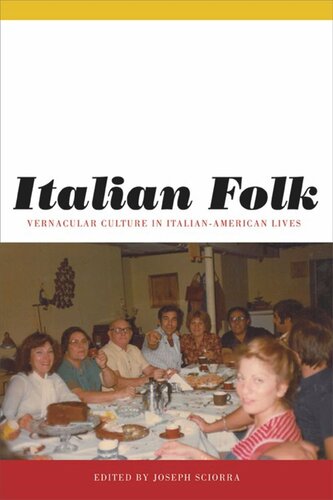

Most ebook files are in PDF format, so you can easily read them using various software such as Foxit Reader or directly on the Google Chrome browser.
Some ebook files are released by publishers in other formats such as .awz, .mobi, .epub, .fb2, etc. You may need to install specific software to read these formats on mobile/PC, such as Calibre.
Please read the tutorial at this link: https://ebookbell.com/faq
We offer FREE conversion to the popular formats you request; however, this may take some time. Therefore, right after payment, please email us, and we will try to provide the service as quickly as possible.
For some exceptional file formats or broken links (if any), please refrain from opening any disputes. Instead, email us first, and we will try to assist within a maximum of 6 hours.
EbookBell Team

4.3
8 reviewsSunday dinners, basement kitchens, and backyard gardens are everyday cultural entities long associated with Italian Americans, yet the general perception of them remains superficial and stereotypical at best. For many people, these scenarios trigger ingrained assumptions about individuals’ beliefs, politics, aesthetics, values, and behaviors that leave little room for nuance and elaboration. This collection of essays explores local knowledge and aesthetic practices, often marked as “folklore,” as sources for creativity and meaning in Italian-American lives. As the contributors demonstrate, folklore provides contemporary scholars with occasions for observing and interpreting behaviors and objects as part of lived experiences. Its study provides new ways of understanding how individuals and groups reproduce and contest identities and ideologies through expressive means. Italian Folk offers an opportunity to reexamine and rethink what we know about Italian Americans. The contributors to this unique book discuss historic and contemporary cultural expressions and religious practices from various parts of the United States and Canada to examine how they operate at local, national, and transnational levels. The essays attest to people’s ability and willingness to create and reproduce certain cultural modes that connect them to social entities such as the family, the neighborhood, and the amorphous and fleeting communities that emerge in large-scale festivals and now on the Internet. Italian Americans abandon, reproduce, and/or revive various cultural elements in relationship to ever-shifting political, economic, and social conditions. The results are dynamic, hybrid cultural forms such as valtaro accordion music, Sicilian oral poetry, a Columbus Day parade, and witchcraft (stregheria). By taking a closer look and an ethnographic approach to expressive behavior, we see that Italian-American identity is far from being a linear path of assimilation from Italian immigrant to American of Italian descent but is instead fraught with conflict, negotiation, and creative solutions. Together, these essays illustrate how folklore is evoked in the continual process of identity revaluation and reformation.